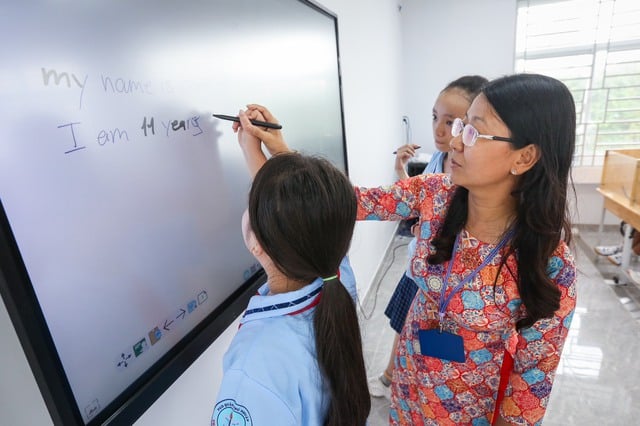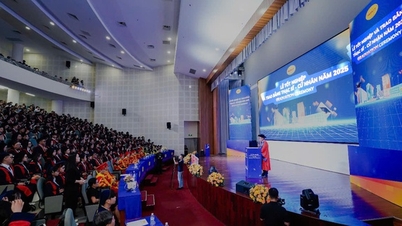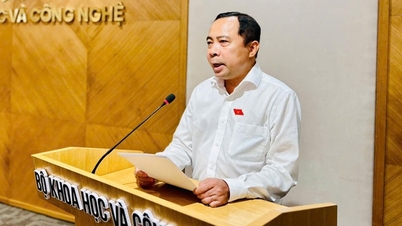
English teachers apply technology in class at Cau Kieu Secondary School (Phu Nhuan District, Ho Chi Minh City)
NHAT THINH
As AI has been and is tending to perform the traditional tasks of a teacher such as providing knowledge, commenting, correcting or suggesting homework, many people have begun to ask the question, "Will AI replace teachers, especially in teaching and learning foreign languages?". To answer this question, we have conducted some research on the level of acceptance as well as pedagogical attitudes of English teachers towards the emergence and development of AI.
What can AI do?
The advent of AI has made foreign language teaching and learning more diverse than ever. AI not only improves some existing teaching activities but also creates new possibilities that would have been difficult for an English teacher 5-10 years ago. As with a general English teacher, AI can create a nearly endless source of text, exercises and images with high accuracy.
Specifically, in the past, compiling outlines and exercises took a lot of time because teachers had to think about the content of the questions and review the content many times. Nowadays, when typing the command line "study the following quizzes and generate 5 more", we can create a rich source of exercises similar in ideas and linguistic accuracy to the level of native speakers.
In addition, teachers can also decorate their own documents with AI-generated pictures with many tools (most of which are free) such as Bing Image Creator or Ideogram. This is especially useful for teachers of children, as they can now completely create their own English storybooks for learners, with personalized content and lower costs than buying genuine English storybooks.
For teachers of writing skills, AI can act as an assistant to help detect errors and give feedback more quickly. For example, there are now many tools to support IELTS marking with detailed feedback, even providing scores (usually for reference only) such as ieltsscience.fun or reboost.vn.
How do English teachers embrace AI?
To understand teachers’ attitudes towards the benefits of AI, we interviewed a number of English teachers with 5-10 years of experience about how they apply AI in teaching writing skills. Through our research, teachers were very excited and interested in AI when it first appeared. This is quite understandable, because popular tools like ChatGPT have the ability to give immediate and continuous feedback, helping them save effort and time on daily tasks.

Illustration of a girl and a bowl of pho created by the AI Ideogram tool
AUTHOR GROUP
However, the above excitement and interest have gradually decreased over time for many reasons. Many teachers are reluctant to use AI in designing lessons and classroom activities because there are no specific policies and guidelines from the school or educational institution where they teach. Concerns about the possibility of cheating also make many teachers hesitate, even limit the use of this technology in the classroom.
For teachers, AI only plays a supporting role and cannot replace traditional teaching materials or methods. At the same time, they also do not have any specific plans to enhance the ability to integrate AI into teaching in the near future.
The team also surveyed English teachers in Vietnam to explore the factors that influence their adoption and use of AI in foreign language teaching. The results showed that a “good support environment” was a decisive factor in helping teachers perceive ChatGPT as both a useful and easy-to-use tool.
To build a supportive environment, educational institutions should first regularly organize training courses and knowledge sharing sessions on AI. These programs should provide detailed instructions on how to use AI tools from basic to advanced, helping teachers master and apply them in teaching practice. When teachers are fully equipped with knowledge and skills, they will be more confident in using AI.
In addition, creating and promoting groups and communities for sharing on social networks is also very important. This will be a place where teachers can exchange experiences, learn from each other and receive timely support when facing difficulties. A positive interactive environment will help teachers feel less isolated and always have support. Finally, recognizing and rewarding efforts and achievements in using AI will be a great motivation, encouraging teachers to boldly innovate and improve teaching methods.
What future for English teachers?
Based on the results of the research we have done, we suggest that teachers should boldly break away from the inherent belief that they are only the ones providing and correcting knowledge for students. Because if we think like that, we will never be able to compare with AI in terms of content, accuracy, speed and convenience of access.

More and more AI tools are supporting teachers in language teaching.
PEXELS
In fact, psychological and neuroscience have long shown that teaching, when understood in its conventional sense of lecturing and correcting, has very little effect on learning. Instead, creating motivation, designing appropriate and personalized lessons, and creating multiple interactions are what really drive learning.
Teachers can directly influence students’ emotions, which is something that AI cannot do at the moment. These emotions, both positive and negative, play an extremely important role in influencing students’ motivation to learn. In addition, foreign language teachers should learn and equip themselves with the skills to use AI for teaching purposes, such as preparing personalized lessons, grading papers and providing appropriate learning plans, or even guiding students to use AI to increase their self-learning ability.
We believe that AI is born as a powerful tool to serve human life, including education. Therefore, teachers should learn to adapt and use it proactively. Understanding their role and capacity, teachers will no longer fear being replaced by AI.
Master Tran Thanh Vu is currently a PhD student at the Faculty of Education, Durham University (UK). Master Nguyen Hoang Mai Tram is a lecturer at the University of Foreign Languages and Information Technology, Ho Chi Minh City. Master Le Khanh Hoang is currently the Deputy Head of Training Department at the ICA/CrushIELTS English Center. Master Do Nguyen Dang Khoa is an administrator of the "People of TESOL" teacher community.
Source: https://thanhnien.vn/chuyen-gia-giao-duc-bay-cach-de-thay-co-khong-so-bi-ai-thay-the-18524072923161833.htm


![[Photo] The Third Patriotic Emulation Congress of the Central Internal Affairs Commission](https://vphoto.vietnam.vn/thumb/1200x675/vietnam/resource/IMAGE/2025/10/30/1761831176178_dh-thi-dua-yeu-nuoc-5076-2710-jpg.webp)
![[Photo] Touching scene of thousands of people saving the embankment from the raging water](https://vphoto.vietnam.vn/thumb/1200x675/vietnam/resource/IMAGE/2025/10/30/1761825173837_ndo_br_ho-de-3-jpg.webp)
![[Photo] National Assembly Chairman Tran Thanh Man receives foreign ambassadors who came to say goodbye](https://vphoto.vietnam.vn/thumb/1200x675/vietnam/resource/IMAGE/2025/10/30/1761820977744_ndo_br_1-jpg.webp)
![[Photo] General Secretary To Lam attends the Vietnam-UK High-Level Economic Conference](https://vphoto.vietnam.vn/thumb/1200x675/vietnam/resource/IMAGE/2025/10/30/1761825773922_anh-1-3371-jpg.webp)

![[Photo] General Secretary To Lam meets former British Prime Minister Tony Blair](https://vphoto.vietnam.vn/thumb/1200x675/vietnam/resource/IMAGE/2025/10/30/1761821573624_tbt-tl1-jpg.webp)








































































































Comment (0)